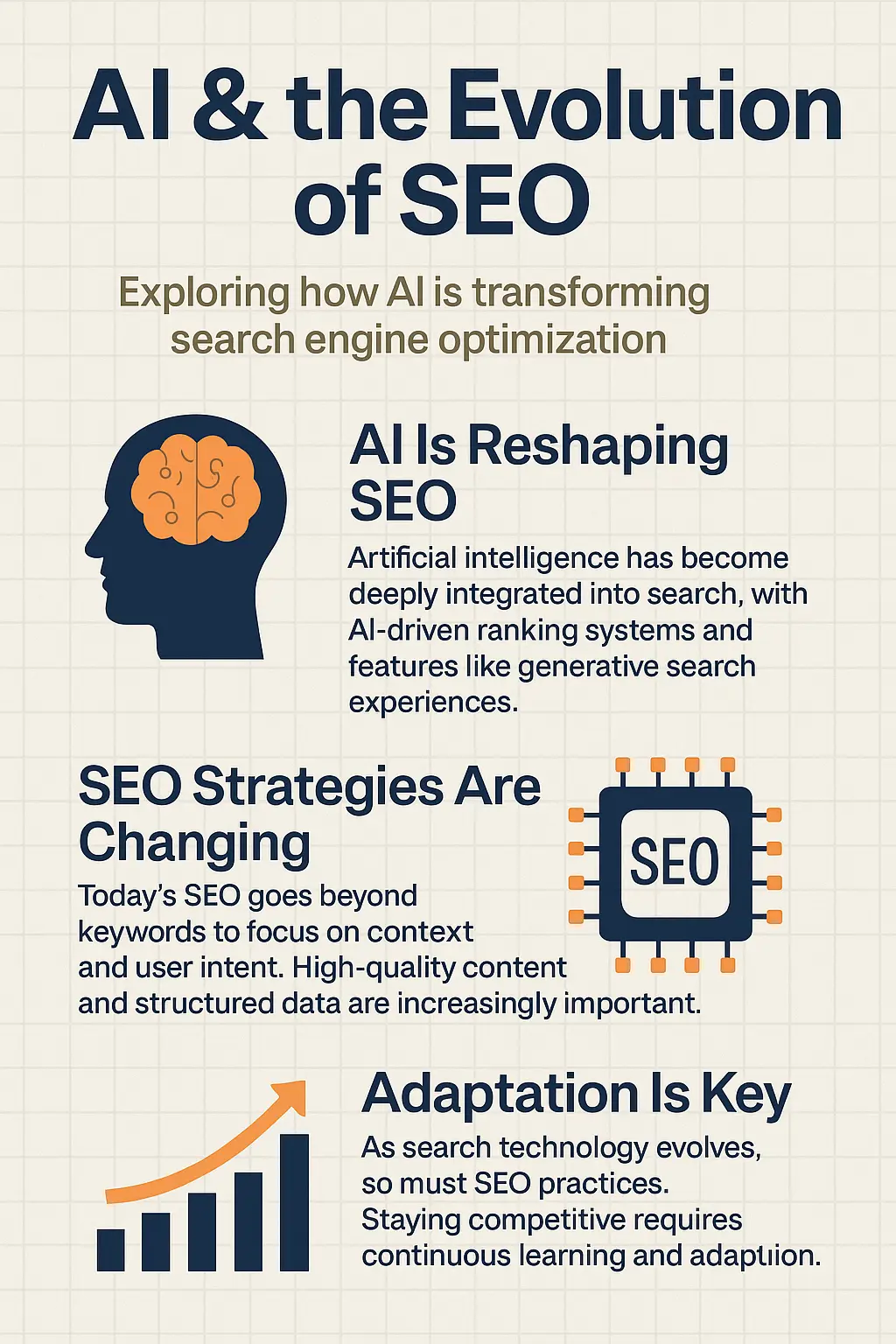0.00%

Technology
That's So Search Engine Optimization
Earlier this year I decided to take some time away from a traditional gig in the world of advertising and spend some time helping friends brand and build their businesses. It was great. But, I was surprised by one thing that shouldn’t have been all that surprising…there’s not nearly enough focus on SEO to help drive business growth. On-page SEO, the practice of optimizing webpage content for search engines, AI platforms, and users, is a critical component often overlooked. Common on-page SEO practices include optimizing title tags, content, internal links, URLs, and other ranking factors. On-page optimization and page optimization are essential for improving individual web pages and blog posts, and optimizing meta descriptions and title tags can boost search rankings. Now that I’m back in the ad world, my SEO red-car-syndrome is in full effect. I see opportunity everywhere.
by Brice Tomlinson
Look, I think we’d all agree that in today’s world, with our innate need to get from A to B as quickly as possible, SEO has emerged as a paramount strategy for businesses. Again, not surprising. What is surprising is the lack of double-clicking into the why. Content should satisfy search intent to maintain rankings on search engine results pages (SERPs), ensuring that users find exactly what they are looking for. Using a target keyword in the first 100 words of an article is an effective on-page SEO tactic that can help achieve this. Thus, I’ve been compelled by the SEO gods to write these words. Stay with me now.
Fact: SEO goes beyond mere keyword optimization; it encompasses a range of techniques aimed at enhancing a site’s visibility on search engines, which drives organic traffic and boosts brand recognition. For businesses, unleashing the power of SEO is not only beneficial; it’s essential for sustained growth and competitiveness. Increasing website traffic and search traffic are key goals of SEO efforts, and analyzing search queries and search terms helps refine content strategy.
Punch above your weight: Traditional marketing methods tend to require significant budgets - ya know, spend money to make money. However, SEO offers a level playing field to compete with larger enterprises. By focusing on targeted keywords and delivering valuable content, your business can rise through the search engine ranks, effectively reaching your audience without needing bags of money (though if you do it right eventually you’ll have em).
See and be seen: Local SEO is a game-changer for businesses aiming to attract nearby customers. Through local citations, Google Business optimization, and location-specific keywords, you can ensure your offerings are prominently displayed to users searching for products or services in their vicinity. Local searches and optimizing for local business listings can help businesses appear in local search results and search listings.
A great first impression: Appearing on the first page of search results is often equated with credibility. For better and for worse, companies that rank higher are perceived as more trustworthy and professional. Leverage strategies like quality content creation, backlink building, and positive customer reviews, to build a reputable brand image. Structured data can enhance your appearance in Google's search results and search listings, and using schema markup can help your particular page stand out.
“Get butts in seats” (if you will): By analyzing search trends and user behavior, businesses can tailor their content and keywords to align with their audience’s preferences, resulting in higher conversion rates. Tools like Google Analytics and Google Ads can provide insights into search engine algorithms, website owner performance, and marketing strategies.
Make bags of money: While some marketing efforts may provide short-term gains, SEO should be seen as a long-term investment. Implementing smart strategies today can yield sustainable results for months, years, millenia (!), ensuring a consistent flow of customers and revenue. Managing duplicate content and using content management systems like a WordPress website can prevent issues that confuse search engines and instructs search engines on how to handle your web pages.
Designed to meet people where they are: Search engines now prioritize mobile-responsive websites in their rankings. Let me say that again. Search engines now prioritize mobile-responsive websites in their rankings. Enhance your user experience and visibility by always thinking mobile first. Optimizing for mobile devices and multiple pages can improve user experience and help search engines find and index your content more efficiently.
Bigger than big data: SEO tools provide valuable insights into user behavior, keyword effectiveness, and website performance. Internal linking is one such important practice, as it helps link high-authority pages to those that need a boost, improving overall site performance. Using schema markup can lead to rich snippets, which can improve click-through rates. Link building and ongoing SEO efforts are crucial for improving SEO rankings and search rankings, and learning SEO is an ongoing process for every website owner. Leverage these insights to refine strategies, make informed decisions, and adapt to changing market dynamics. Owning your own website allows you to implement these strategies directly, and telling search engines and instructing search engines through proper technical setup is essential for SEO success.

Know this: SEO is not old, it’s always.
Search engine optimization (SEO) isn’t a relic of the early internet—it’s a living, breathing discipline that evolves as fast as search engines themselves. Every time Google or other search engines tweak their algorithms, the rules of the game shift. That means website owners can’t afford to set and forget their SEO strategy. Staying ahead requires a commitment to ongoing learning, regular keyword research, and the smart use of SEO tools to keep your site competitive in search engine rankings.
Today’s search engine optimization SEO landscape is about more than just sprinkling relevant keywords into your content. It’s about understanding how search engines interpret search intent, how they crawl and index your site, and how you can use data-driven insights to refine your approach. Whether you’re optimizing a blog post or an entire site, keeping up with the latest trends and best practices is non-negotiable. The most successful website owners are those who treat SEO as an ongoing journey, not a one-time project—constantly adapting, testing, and improving to stay visible in the ever-changing world of search.
The Engine Under the Hood: Technical Optimization
Think of technical SEO as the finely tuned engine that powers your website’s performance in search results. It’s not just about what your visitors see—it’s about making sure search engine crawlers can easily access, understand, and index your site pages. This means optimizing meta descriptions and title tags so they tell search engines exactly what each page is about, and using internal links to guide both users and crawlers to your most important content.
Tools like Google Search Console are invaluable for website owners, offering a behind-the-scenes look at how your site is performing in google search and other search engines. They help you spot technical issues, monitor search engine rankings, and identify opportunities for technical SEO optimization. Ensuring your site is mobile-friendly is no longer optional—search engines like Google prioritize mobile device compatibility, so a responsive design is essential for SEO success.
But technical SEO doesn’t stop there. Building quality links from other websites signals to search engines that your content is trustworthy and authoritative, boosting your site rank in organic search results. For local businesses, local SEO is a game-changer: optimizing for local search results and earning links from local websites can put your business on the map—literally—when customers search for services nearby.
A successful SEO strategy also means thinking about search intent and user experience. Your content should answer the questions your audience is actually asking, and your site should be easy to navigate, with clear internal linking and fast load times. By combining technical SEO with a thoughtful content strategy, you’ll not only improve your search engine rankings but also attract more organic traffic and keep visitors coming back.
Whether you’re a seasoned SEO specialist or just starting to learn SEO, remember: technical optimization is the invisible power that drives your website’s SEO performance. Stay curious, keep testing, and use every tool at your disposal to unlock the full potential of your site in search engine results.
Unlocking the invisible power that drives your site’s search success.
AI is reshaping SEO:
Artificial intelligence has become inseparable from modern search. Google’s AI-driven ranking systems—think RankBrain, BERT, and the more recent Gemini updates—analyze context, semantics and user intent far beyond simple keyword matching. With AI now powering features like generative search experiences (SGE) and conversational answers, SEO isn’t just about ranking blue links anymore; it’s about earning visibility inside AI-generated summaries and featured snippets.
For marketers, AI tools themselves are game-changers: they can surface hidden keyword opportunities, predict seasonal trends, automate technical audits, and even help create content outlines that match search intent. This doesn’t mean human creativity is obsolete—if anything, it raises the bar. High-quality, authoritative, and unique content remains the differentiator that AI systems reward.
SEO will keep evolving alongside these technologies. Strategies that worked five years ago—exact-match keywords, link spamming—fade as algorithms grow smarter. Tomorrow’s SEO will revolve around entity optimization, structured data, and demonstrating expertise and trustworthiness across every piece of content. The only constant is change, and staying competitive means adapting as AI continues to rewrite the search landscape.
Know this: SEO is not old, search engines are always evolving.
Before I go know that SEO has evolved from a technical practice to a fundamental marketing strategy. Regular monitoring and updates are essential for effective on-page SEO as algorithms and user behaviors change. Wix's performance infrastructure includes automatic caching to improve page load times, which is a critical factor for SEO success. Embrace it, with loving open arms that will soon be filled with Money. I want that for you, for everyone. If you want it to and need some help, we're passionate about SEO here at Matic Digital.

About Matic
We're a B2B transformation agency creating strategic advantage through branding, websites, and digital products.


